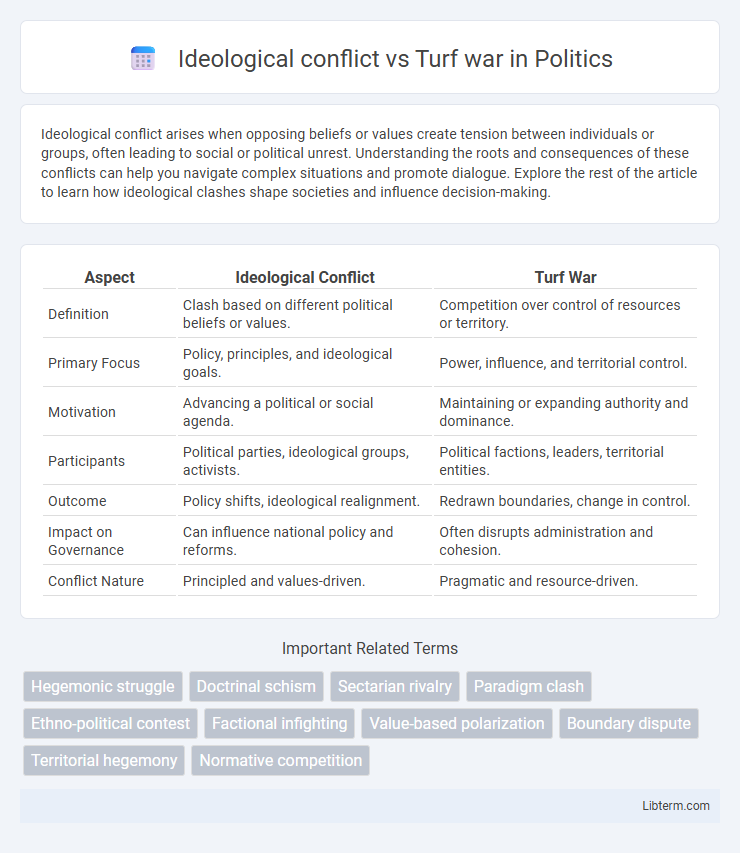Ideological conflict arises when opposing beliefs or values create tension between individuals or groups, often leading to social or political unrest. Understanding the roots and consequences of these conflicts can help you navigate complex situations and promote dialogue. Explore the rest of the article to learn how ideological clashes shape societies and influence decision-making.
Table of Comparison
| Aspect | Ideological Conflict | Turf War |
|---|---|---|
| Definition | Clash based on different political beliefs or values. | Competition over control of resources or territory. |
| Primary Focus | Policy, principles, and ideological goals. | Power, influence, and territorial control. |
| Motivation | Advancing a political or social agenda. | Maintaining or expanding authority and dominance. |
| Participants | Political parties, ideological groups, activists. | Political factions, leaders, territorial entities. |
| Outcome | Policy shifts, ideological realignment. | Redrawn boundaries, change in control. |
| Impact on Governance | Can influence national policy and reforms. | Often disrupts administration and cohesion. |
| Conflict Nature | Principled and values-driven. | Pragmatic and resource-driven. |
Understanding Ideological Conflict: Core Principles
Ideological conflict centers on fundamental beliefs and values that shape individuals' or groups' worldviews, often driving deep divisions over social, political, or cultural issues. Unlike turf wars, which primarily involve competition over specific control or resources, ideological conflicts are rooted in differences regarding ideas, principles, and systemic visions. Understanding ideological conflict requires analyzing core principles such as identity, narrative frameworks, and moral imperatives that influence behavior and escalate disputes beyond mere territorial or power struggles.
Defining Turf War in Organizational Settings
A turf war in organizational settings refers to conflicts arising when individuals or departments compete for control, resources, or influence over a specific area of responsibility. Unlike ideological conflicts, which stem from differing beliefs or values, turf wars center on power dynamics and territorial claims within the company structure. These disputes can hinder collaboration, reduce efficiency, and create a fragmented work environment, impacting overall organizational performance.
Key Differences Between Ideological Conflict and Turf War
Ideological conflict centers on fundamental beliefs, values, and principles that create deep divisions between groups, often involving ethical, political, or religious motivations. Turf wars revolve around competition for control, influence, or resources within a specific territory or domain, emphasizing power and material interests rather than core beliefs. The key difference lies in ideological conflicts being driven by incompatible worldviews, whereas turf wars are motivated by practical disputes over boundaries or authority.
Historical Examples of Ideological Conflict
Historical examples of ideological conflict include the Cold War between the United States and the Soviet Union, representing capitalism versus communism, and the Spanish Civil War, a struggle between fascism and republican democracy. These conflicts were driven by deeply held beliefs and values, shaping political systems and global alliances for decades. Unlike turf wars, which revolve around territorial control, ideological conflicts often inspire widespread social movements and international interventions.
Real-World Cases of Turf Wars
Turf wars frequently emerge in organizational and political settings where control over resources, territory, or influence is contested without underlying ideological differences. Real-world cases include corporate competition between tech giants like Facebook and Google, where market dominance and user base control spark turf disputes absent of ideological rifts. In urban law enforcement, overlapping jurisdiction between police departments often leads to turf wars focused on control rather than policy or ideological divergence.
Motivations Driving Ideological Conflicts
Ideological conflicts are primarily driven by deeply held beliefs, values, and worldviews that individuals or groups seek to defend or promote, often motivated by identity, moral convictions, or visions for society. In contrast, turf wars center on control over specific resources, power, or territory, motivated by pragmatic interests and competitiveness rather than abstract principles. Understanding these motivations is crucial for conflict resolution, as ideological disputes often require addressing underlying values, whereas turf wars demand negotiation over tangible assets.
Power Dynamics Fueling Turf Wars
Power dynamics in turf wars stem from competing groups striving to assert control and maintain dominance within overlapping or contested territories, often driven by strategic interests rather than ideological beliefs. These conflicts are marked by a struggle to secure resources, influence, and authority, where power imbalances can escalate tensions and lead to prolonged confrontations. Unlike ideological conflicts rooted in fundamental belief systems, turf wars prioritize pragmatic control, making power distribution the central catalyst for disputes.
Impact on Team Performance and Collaboration
Ideological conflict often leads to deep-rooted disagreements within teams, negatively affecting communication and shared goals, thereby impairing overall performance and collaboration. Turf wars create competitive environments where individuals prioritize personal domains over collective success, resulting in reduced trust and information hoarding. Both dynamics disrupt team cohesion, but ideological conflicts tend to challenge value alignment, while turf wars primarily undermine cooperative workflows.
Conflict Resolution Strategies for Both Scenarios
Ideological conflict resolution strategies emphasize open dialogue, active listening, and values clarification to foster mutual understanding and respect for differing belief systems. Turf war conflicts benefit from clear boundary setting, task delegation, and collaborative problem-solving to address resource competition and territorial disputes. Both scenarios require tailored communication techniques and mediation interventions to de-escalate tensions and promote sustainable agreements.
Building a Culture to Prevent Ideological and Turf Conflicts
Building a culture that prioritizes open communication and shared goals is essential to prevent ideological conflicts and turf wars within organizations. Encouraging collaboration and mutual respect among teams reduces competition over territories and diminishes rigid adherence to conflicting beliefs. Implementing transparent decision-making processes and promoting a unified vision fosters alignment and minimizes divisive struggles.
Ideological conflict Infographic

 libterm.com
libterm.com